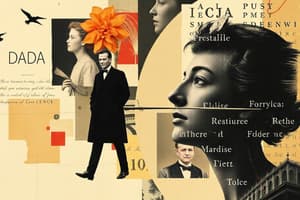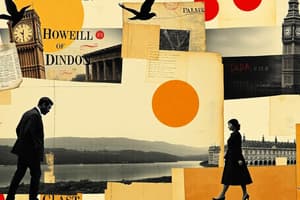Podcast
Questions and Answers
What is a key theme found in Old English literature?
What is a key theme found in Old English literature?
- Social criticism
- Heroism and the struggle of good vs. evil (correct)
- Existentialism
- Emotion and nature
Which author is associated with Middle English literature?
Which author is associated with Middle English literature?
- William Shakespeare
- Charles Dickens
- John Milton
- Geoffrey Chaucer (correct)
What characterizes the Renaissance literature period?
What characterizes the Renaissance literature period?
- Flourishing of poetic forms and humanism (correct)
- Focus on social issues and morality
- Emphasis on emotion and individualism
- Development from classical Greek drama
Which literary movement emerged as a reaction against industrialization?
Which literary movement emerged as a reaction against industrialization?
Who is a prominent novelist of the Victorian period?
Who is a prominent novelist of the Victorian period?
What is a primary focus of Modernist literature?
What is a primary focus of Modernist literature?
Which of the following genres includes sonnets and free verse?
Which of the following genres includes sonnets and free verse?
What theme is commonly explored in existentialism within literature?
What theme is commonly explored in existentialism within literature?
Flashcards are hidden until you start studying
Study Notes
Overview of English Literature
- English literature encompasses literary works produced in the English language across various periods and genres.
- Includes poetry, drama, prose, and essays.
Historical Periods
-
Old English Literature (c. 450-1150)
- Key works: "Beowulf," Anglo-Saxon poetry.
- Themes of heroism, fate, and the struggle of good vs. evil.
-
Middle English Literature (c. 1150-1500)
- Notable authors: Geoffrey Chaucer ("The Canterbury Tales").
- Shift towards realism and vernacular.
-
Renaissance Literature (c. 1500-1660)
- Flourishing of poetic forms and humanism.
- Prominent figures: William Shakespeare, John Milton ("Paradise Lost").
-
Restoration and 18th Century (1660-1798)
- Rise of satire and essays (e.g., Jonathan Swift, Alexander Pope).
- Themes of reason and social criticism.
-
Romantic Period (1798-1837)
- Emphasis on emotion, nature, and individualism.
- Key poets: William Wordsworth, Samuel Taylor Coleridge, Percy B. Shelley, John Keats.
-
Victorian Literature (1837-1901)
- Focus on social issues, morality, and realism.
- Notable authors: Charles Dickens, George Eliot, Thomas Hardy.
-
Modernism (c. 1900-1945)
- Break from tradition; experimentation with form and perspective.
- Key figures: Virginia Woolf, James Joyce, T.S. Eliot.
-
Postmodernism (1945-present)
- Fragmentation, irony, and questioning of narratives.
- Notable authors: Salman Rushdie, Don DeLillo, Jeanette Winterson.
Genres in English Literature
-
Poetry
- Forms: sonnets, ballads, free verse.
- Major poets: Emily Dickinson, Robert Frost.
-
Drama
- Development from classical Greek to contemporary forms.
- Influential playwrights: Arthur Miller, Harold Pinter.
-
Novel
- Various forms: bildungsroman, historical, dystopian.
- Prominent novelists: Jane Austen, F. Scott Fitzgerald.
-
Essays and Non-Fiction
- Reflections on society, culture, and personal experience.
- Key essayists: George Orwell, Virginia Woolf.
Key Themes in English Literature
- Identity and self-discovery.
- Social class and inequality.
- The human condition and existentialism.
- Nature and the sublime.
- Historical context and its influence on literature.
Important Literary Movements
- Romanticism: Reaction against industrialization, focus on emotion and nature.
- Realism: Depicts everyday life and society accurately.
- Existentialism: Explores themes of absurdity and individual freedom.
- Surrealism: Blends reality and dream, often illogical or fantastical.
Notable Literary Devices
- Imagery: Descriptive language that evokes sensory experiences.
- Symbolism: Use of symbols to represent ideas or qualities.
- Irony: Contrast between appearance and reality.
- Metaphor and Simile: Comparisons to convey deeper meanings.
Tips for Studying English Literature
- Focus on historical context for better understanding of themes and styles.
- Read primary texts along with critical essays for deeper analysis.
- Discuss interpretations with peers for diverse perspectives.
- Create timelines to track literary movements and key figures.
Overview of English Literature
- Encompasses literary works written in English across various periods and genres
- Includes poetry, drama, prose, and essays
Historical Periods
- Old English Literature (c. 450-1150)
- Key works: Beowulf, Anglo-Saxon poetry
- Themes of heroism, fate, and the struggle of good vs. evil
- Middle English Literature (c. 1150-1500)
- Notable authors: Geoffrey Chaucer (The Canterbury Tales)
- Shift towards realism and vernacular language
- Renaissance Literature (c. 1500-1660)
- Flourishing of poetic forms and humanism
- Prominent figures: William Shakespeare, John Milton (Paradise Lost)
- Restoration and 18th Century (1660-1798)
- Rise of satire and essays (e.g., Jonathan Swift, Alexander Pope)
- Themes of reason and social criticism
- Romantic Period (1798-1837)
- Emphasis on emotion, nature, and individualism
- Key poets: William Wordsworth, Samuel Taylor Coleridge, Percy B. Shelley, John Keats
- Victorian Literature (1837-1901)
- Focus on social issues, morality, and realism
- Notable authors: Charles Dickens, George Eliot, Thomas Hardy
- Modernism (c. 1900-1945)
- Break from tradition; experimentation with form and perspective
- Key figures: Virginia Woolf, James Joyce, T.S. Eliot
- Postmodernism (1945-present)
- Fragmentation, irony, and questioning of narratives
- Notable authors: Salman Rushdie, Don DeLillo, Jeanette Winterson
Genres in English Literature
- Poetry
- Forms: sonnets, ballads, free verse
- Major poets: Emily Dickinson, Robert Frost
- Drama
- Development from classical Greek to contemporary forms
- Influential playwrights: Arthur Miller, Harold Pinter
- Novel
- Various forms: bildungsroman, historical, dystopian
- Prominent novelists: Jane Austen, F. Scott Fitzgerald
- Essays and Non-Fiction
- Reflections on society, culture, and personal experience
- Key essayists: George Orwell, Virginia Woolf
Key Themes in English Literature
- Identity and self-discovery
- Social class and inequality
- The human condition and existentialism
- Nature and the sublime
- Historical context and its influence on literature
Important Literary Movements
- Romanticism: Reaction against industrialization, focus on emotion and nature
- Realism: Depicts everyday life and society accurately
- Existentialism: Explores themes of absurdity and individual freedom
- Surrealism: Blends reality and dream, often illogical or fantastical
Notable Literary Devices
- Imagery: Descriptive language that evokes sensory experiences
- Symbolism: Use of symbols to represent ideas or qualities
- Irony: Contrast between appearance and reality
- Metaphor and Simile: Comparisons to convey deeper meanings
Tips for Studying English Literature
- Focus on historical context for better understanding of themes and styles
- Read primary texts along with critical essays for deeper analysis
- Discuss interpretations with peers for diverse perspectives
- Create timelines to track literary movements and key figures
Studying That Suits You
Use AI to generate personalized quizzes and flashcards to suit your learning preferences.




